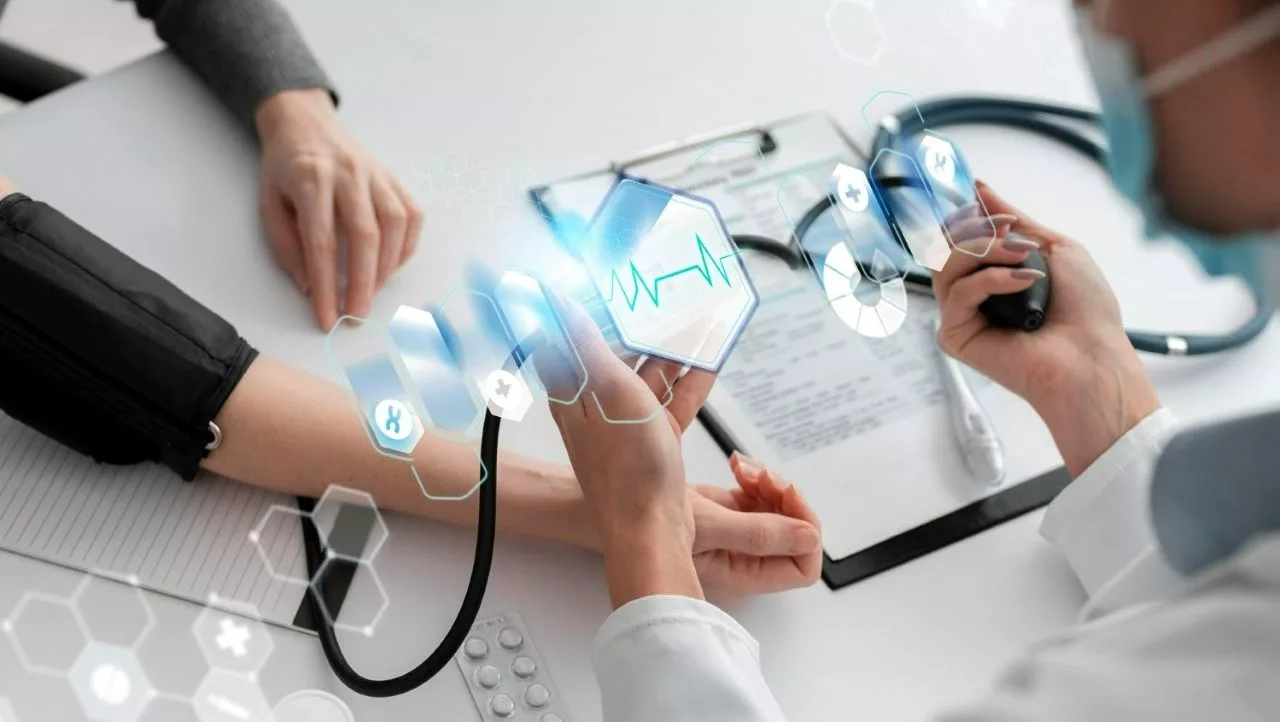In today’s digital age, healthcare technology is revolutionizing the way medical care is delivered, improving patient outcomes, and enhancing the overall efficiency of the healthcare industry.
With advancements in healthcare technology, professionals now can diagnose, treat, and manage diseases more effectively, leading to better patient experiences and improved healthcare outcomes.
Healthcare technology refers to the application of technological advancements in the field of healthcare to improve patient care, enhance efficiency, and accelerate medical research.
From electronic health records to telemedicine and artificial intelligence, these innovations are transforming the way healthcare is delivered, making it more accessible, cost-effective, and personalized.
1. Electronic Health Records (EHR)
Electronic Health Records (EHR) have replaced traditional paper-based medical records, enabling healthcare providers to store, access, and share patient information securely and efficiently.
With EHR systems, medical professionals can access a patient’s complete medical history, including diagnoses, medications, lab results, and treatment plans, all in one centralized digital platform.
This seamless information exchange improves care coordination, reduces medical errors, and enhances patient safety.
2. Telemedicine
Telemedicine has emerged as a game-changer in healthcare technology delivery, especially for individuals in remote areas or those with limited mobility. It involves the use of telecommunications technology to provide remote clinical services, such as virtual consultations, remote monitoring, and telehealth education.
Telemedicine enables patients to receive medical advice, diagnoses, and treatment recommendations from healthcare professionals without the need for in-person visits. This approach improves access to healthcare, saves time, and reduces healthcare costs.
3. Artificial Intelligence (AI) in Healthcare
Artificial Intelligence (AI) has made significant strides in healthcare, empowering medical professionals with advanced tools for diagnosis, treatment planning, and patient monitoring.
AI algorithms can analyze vast amounts of medical data, such as imaging scans, pathology reports, and patient records, to identify patterns, predict disease progression, and recommend personalized treatment options.
AI-powered technologies, like machine learning and natural language processing, are revolutionizing radiology, pathology, and genomics, leading to more accurate diagnoses and tailored treatment plans.
4. Internet of Things (IoT) in Healthcare
The Internet of Things (IoT) has paved the way for connected healthcare devices, allowing seamless data exchange and real-time monitoring of patients.
IoT-enabled medical devices, such as wearable fitness trackers, smartwatches, and remote patient monitoring systems, can collect and transmit vital signs, activity levels, and other health-related data to healthcare providers.
This constant stream of information enables early detection of health issues, timely interventions, and proactive healthcare management.
5. Robotics and Automation
Robotic technology and automation have revolutionized surgical procedures, offering increased precision, shorter recovery times, and reduced risks for patients. Robotic-assisted surgery allows surgeons to perform complex procedures with enhanced dexterity and accuracy.
Robotic systems provide real-time feedback, enabling surgeons to navigate challenging anatomical structures and perform minimally invasive surgeries with greater precision.
Automation in healthcare facilities also streamlines administrative tasks, such as appointment scheduling and inventory management, freeing up healthcare professionals’ time for patient care.
6. Wearable Devices
Wearable devices, such as fitness trackers and smartwatches, have gained popularity in recent years, empowering individuals to monitor their health and make informed lifestyle choices. These devices can track various health parameters, including heart rate, sleep patterns, physical activity, and calories burned.
By leveraging this data, users can gain insights into their overall health and take proactive measures to improve their well-being. Wearable devices encourage individuals to adopt healthy habits, leading to better disease prevention and management.
7. Virtual Reality (VR) and Augmented Reality (AR) in Healthcare
Virtual Reality (VR) and Augmented Reality (AR) technologies are finding valuable applications in medical training and patient care. VR-based simulations provide medical students and healthcare technology professionals with immersive training experiences, allowing them to practice complex procedures and develop their skills in a risk-free environment.
AR enhances surgical precision by overlaying real-time patient data and imaging onto a surgeon’s field of view, aiding in precise anatomical navigation during surgeries. These technologies enhance medical education, improve surgical outcomes, and enhance patient engagement and understanding.
8. Big Data Analytics
The healthcare technology industry generates vast amounts of data daily, and leveraging this data effectively can lead to better healthcare decision-making. Big data analytics tools can process and analyze large datasets to identify trends, patterns, and correlations that may not be apparent through traditional analysis methods.
By extracting insights from big data, healthcare providers can optimize resource allocation, predict disease outbreaks, and identify personalized treatment approaches based on patients’ demographics, genetics, and lifestyle factors.
9. Blockchain in Healthcare
Blockchain technology is revolutionizing data security and privacy in healthcare. It provides a decentralized and tamper-proof system for storing and sharing medical records, ensuring data integrity and protecting patient privacy.
Blockchain enables secure sharing of sensitive medical information between healthcare providers, improving care coordination and reducing administrative burdens. Moreover, patients have better control over their data, granting access only to authorized healthcare professionals.
10. Cybersecurity in Healthcare
With the increasing reliance on digital systems in healthcare, ensuring the security of patient information is of paramount importance. Cybersecurity measures are essential to protect electronic health records, connected medical devices, and other healthcare technologies from cyber threats.
Robust security protocols, encryption techniques, and regular security audits are vital to safeguard patient data and prevent unauthorized access or data breaches.
11. Personalized Medicine
Personalized medicine aims to provide tailored healthcare solutions based onan individual’s unique genetic makeup, lifestyle factors, and medical history. Advances in healthcare technology have paved the way for personalized medicine, allowing healthcare providers to develop treatment plans that are more effective and tailored to each patient’s specific needs.
By analyzing a patient’s genetic information, researchers can identify genetic variations that may influence their response to certain medications or therapies. This knowledge enables healthcare professionals to prescribe treatments that have a higher likelihood of success and minimize potential adverse effects.
12. Gene Editing and CRISPR Technology
Gene editing healthcare technology, such as CRISPR-Cas9, have revolutionized the field of genetic research and therapy. These tools allow scientists to make precise changes to the DNA of living organisms, offering potential treatments for genetic disorders and diseases.
CRISPR technology has the potential to correct genetic mutations, prevent the transmission of inherited diseases, and even eradicate certain genetic conditions altogether. The development of gene editing techniques has opened up new avenues for targeted therapies and holds promise for the future of healthcare.
13. Nanotechnology in Healthcare
Nanotechnology involves manipulating materials and structures at the nanoscale (one billionth of a meter) to create innovative solutions in various fields, including healthcare. In medicine, nanotechnology has shown immense potential in drug delivery systems and disease detection.
Nanoparticles can be engineered to carry medications directly to specific target cells or tissues, increasing drug efficacy and reducing side effects. Additionally, nanosensors and nanodevices enable early and precise disease detection, leading to earlier interventions and improved treatment outcomes.
Conclusion
Healthcare technology is transforming the landscape of medical care, bringing forth innovative solutions that improve patient outcomes, increase efficiency, and advance medical research.
From electronic health records and telemedicine to artificial intelligence and nanotechnology, these advancements are revolutionizing the way healthcare is delivered and experienced.
Embracing these technologies holds the potential to enhance healthcare accessibility, quality, and personalization.
Frequently Asked Questions (FAQs)
How is healthcare technology improving patient outcomes?
Healthcare technology enables more accurate diagnoses, personalized treatment plans, and real-time monitoring, leading to improved patient outcomes.
What are the benefits of telemedicine?
Telemedicine offers convenient access to healthcare services, particularly for individuals in remote areas or with limited mobility. It reduces the need for in-person visits and saves time and costs.
How does artificial intelligence enhance healthcare technology?
Artificial intelligence analyzes vast amounts of medical data, facilitating precise diagnoses, personalized treatment options, and predictive analytics for disease management.
What role does wearable healthcare technology play in?
Wearable devices empower individuals to monitor their health, encourage healthy habits, and provide valuable data for proactive healthcare management.
How does blockchain technology enhance healthcare data security?
Blockchain provides a decentralized and tamper-proof system for storing and sharing medical records, ensuring data integrity and protecting patient privacy. (AI)
Follow BloggerBorneo.com @Google News























